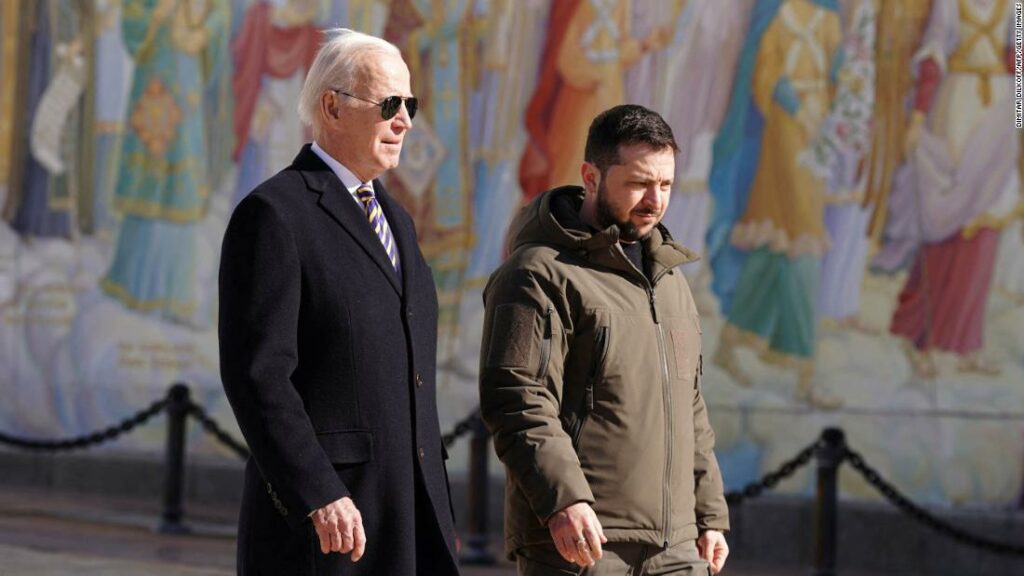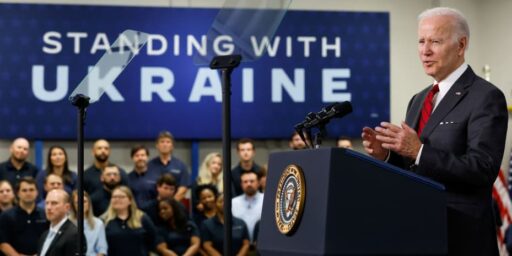Zelensky Privately Wants to Attack Russia Targets
Leaked intelligence intercepts take us inside the Ukrainian war room.

WaPo (“Zelensky, in private, plots bold attacks inside Russia, leak shows“):
Ukrainian President Volodymyr Zelensky has won the trust of Western governments by refusing to use the weapons they provide for attacks inside Russia and prioritizing the targeting of Russian forces inside Ukraine’s borders.
But behind closed doors, Ukraine’s leader has proposed going in a more audacious direction — occupying Russian villages to gain leverage over Moscow, bombing a pipeline that transfers Russian oil to Hungary, a NATO member, and privately pining for long-range missiles to hit targets inside Russia’s borders, according to classified U.S. intelligence documents detailing his internal communications with top aides and military leaders.
The documents, which have not been previously disclosed, are part of a broader leak of U.S. secrets circulated on the Discord messaging platform and obtained by The Washington Post. They reveal a leader with aggressive instincts that sharply contrast with his public-facing image as the calm and stoic statesman weathering Russia’s brutal onslaught. The insights were gleaned through intercepted digital communications, providing a rare look at Zelensky’s deliberations amid Russian missile barrages, infrastructure attacks and war crimes.
The Pentagon, where senior U.S. military leaders were briefed on the matters outlined in the leaked documents, did not dispute the authenticity of the materials.
In some cases, Zelensky is seen restraining the ambitions of his subordinates; in several others, he is the one proposing risky military actions.
In a meeting in late January, Zelensky suggested Ukraine “conduct strikes in Russia” while moving Ukrainian ground troops into enemy territory to “occupy unspecified Russian border cities,” according to one document labeled “top secret.” The goal would be “to give Kyiv leverage in talks with Moscow,” the document said.
In a separate meeting in late February with Gen. Valery Zaluzhny, Ukraine’s top military commander, Zelensky “expressed concern” that “Ukraine does not have long-range missiles capable of reaching Russian troop deployments in Russia nor anything with which to attack them.” Zelensky then “suggested that Ukraine attack unspecified deployment locations in Rostov,” a region in western Russia, using drones instead, according to another classified document.
In a meeting in mid-February with Deputy Prime Minister Yuliya Svrydenko, Zelensky suggested Ukraine “blow up” the Soviet-built Druzhba pipeline that provides oil to Hungary. “Zelenskyy highlighted that … Ukraine should just blow up the pipeline and destroy likely Hungarian [Prime Minister] Viktor Orban’s industry, which is based heavily on Russian oil,” the document says.
In detailing the conversation, intelligence officials concede that Zelensky was “expressing rage toward Hungary and therefore could be making hyperbolic, meaningless threats,” a qualification that does not accompany the other accounts of Zelensky suggesting bold military action. Though Hungary is nominally part of the Western alliance, Orban is widely considered Europe’s most Kremlin-friendly leader.
When asked if he had suggested occupying parts of Russia, Zelensky, during an interview with The Post in Kyiv, dismissed the U.S. intelligence claims as “fantasies” but defended his right to use unconventional tactics in the defense of his country.
“Ukraine has every right to protect itself, and we are doing it. Ukraine did not occupy anyone, but vice versa,” Zelensky said. “When so many people have died and there have been mass graves and our people have been tortured, I am sure that we have to use any tricks.”
The use of long-range missiles to hit inside Russia is a particularly sensitive topic for the White House, which has long worried that the Ukraine conflict could escalate out of control and force a catastrophic standoff between the United States and Russia, the world’s largest nuclear powers.
Though Washington has given Zelensky billions of dollars’ worth of advanced weaponry, President Biden has steadily rebuffed the Ukrainian leader’s request for long-range ATACMS, shorthand for the Army Tactical Missile System, capable of striking targets up to 185 miles away. Since the start of the war, Biden has said the United States is “not encouraging or enabling Ukraine to strike beyond its borders.”
When asked about the intelligence indicating he had weighed the use of long-range missiles to hit Russia, Zelensky said it is not something Ukraine is entertaining. “No one in our country has given orders for offensives or strikes on Russian territory,” he said.
It’s hardly shocking that Zelensky wants to take the war to Russia. His country has been invaded and his counterpart has ordered continuing atrocities. By containing the war inside his own borders, he’s essentially fighting with one hand tied behind his back.
This is a classic case of the proxy and their backers having divergent interests. In a bilateral fight with Russia, Zelensky has little to lose and much to gain from taking out key assets inside Russia proper. He’s restrained by the need for Western weapons, material, and diplomatic support to sustain the war effort. Indeed, Ukraine would now be a Russian province, albeit perhaps one fighting a guerrilla campaign to take it back, without the massive amounts of armament NATO has supplied.
NATO countries, meanwhile, ultimately fear escalation of the war beyond Ukraine—especially the not-inconceivable use of nuclear weapons—more than the effects of a long, dragged out fight on the Ukrainian people. That, too, is understandable.
Thus, the standoff: we’re pouring an inordinate amount of resources into the Ukraine fight, both out of genuine humanitarian concern for an invaded people and because it’s an opportunity to weaken the most “acute” adversary identified in our national strategy. So, we’re hedging our bets.
It is unclear whether the United States has shared accounts of Zelensky’s plotting with allied nations, but the Ukrainian president continues to enjoy the strong support of Western governments, which have provided him with an increasingly sophisticated array of weaponry.
This past week, Britain became the first Western country to provide Ukraine with long-range missiles. The Storm Shadow, a cruise missile system with stealth capabilities, has a range of 155 miles, far exceeding the 50-mile range of the U.S.-provided HIMARS launchers.
British Defense Minister Ben Wallace said Friday that the missile would give Ukraine “the best chance” to defend itself and would be for use only “within Ukrainian sovereign territory.” A spokesman with the British Embassy in Washington declined to comment on whether Zelensky’s leaked remarks might give London pause about its decision.
The Biden administration says Zelensky’s intercepted comments are not the cause for withholding ATACMS.
“Ukraine has repeatedly committed to employ U.S.-provided weapons responsibly and strategically when needed to counter Russian aggression, and we are confident that will continue to be the case,” said a U.S. defense official who, like others interviewed for this report, spoke on the condition of anonymity to discuss a sensitive topic.
Since last year, Zelensky has promised that Ukraine would never use U.S. weapons to strike inside Russia, a pledge the White House says he has fulfilled.
“President Zelensky has kept the promises he has made to President Biden, and we do not believe that that will change,” said a senior administration official.
One reason for not providing the long-range missiles is the “relatively few ATACMS” the United States has for its own defense needs, Gen. Mark A. Milley, chairman of the Joint Chiefs of Staff, told Defense One in March.
Zelensky, however, said he believes the United States isn’t sending the weapons because it doesn’t trust Kyiv.
“I think they are afraid that we might use them on the territory of Russia,” Zelensky told The Post. “But I would always tell our partners … ‘We have a priority target for which we are spending the ammunition packages we receive, and we spend it on the deoccupation of purely Ukrainian territories,’” he said.
While there is no indication that Ukraine has used Western missiles to strike into Russian territory, the same cannot be said for Kyiv’s use of armed drones.
Explosions caused by unmanned aerial vehicles have become a regular occurrence in Russia, including in Rostov, where a drone crashed into an oil refinery this month. Ukrainian officials are often coy about the incidents, hinting that they’re responsible without directly taking credit.
Two drone attacks in December on Russia’s Engels air base in Saratov, more than 370 miles from the Ukrainian border, showed “that we have the ability to reach many kilometers farther than they could expect,” Oleksiy Danilov, secretary of Ukraine’s National Security and Defense Council, said in an interview earlier this year.
Russia this month accused Ukraine of staging a drone attack intended to kill President Vladimir Putin in the Kremlin. Videos circulating on social media and verified by The Post show two drones streaking toward the Kremlin at about 2:30 a.m. local time. The allegation was forcefully denied by Ukrainian officials, including Zelensky.
While I’m decidedly a Ukrainian partisan in the fight, that doesn’t mean I take Zelensky at is word on these matters. The pressures on him are enormous and, as much as I’m sure he appreciates the massive support he’s getting from the West, I’m also sure he resents that he’s getting it incrementally while his people are being slaughtered. I can’t say that I blame him.
At the same time, I fully get the Biden administration’s hedging. Arming a sovereign nation to defend against external aggression is one thing. Supplying long-range missiles to attack inside Russia itself is another. Putin would, quite rightly, not distinguish an attack on his homeland by an American missile fired by Ukranian forces or American forces.





I’ve been wondering whether the Ukraine or the US or some combination has taken advantage of the leaks to get stuff out without having to formerly acknowledge it. This may be such a case. If Zelensky had publicly stated that he wanted to attack Russia it would have to be debated and discussed in the open. Now all he has to do is say, “We don’t comment on random leaks”.
Note that I’m not saying the Discord leaks are staged, just that when a flurry of unvetted information makes it into the wild it would be easy to throw a few other things in their with it in order to get them out.
If the war progresses and Ukraine is successful in pushing Russia back, attacking targets within Russia is inevitable as that will be where the staging and resupply logistics will be based.
The logic of Putin’s seizure of the 4 eastern provinces as that they are now part of Russia, so by that measure Ukraine is already attacking Russia. The reticence of west is understandable, but it will result in providing Russia with a limited victory.
Ukraine has to take a couple of railhead cities in Eastern Russia to stop the Russian ability to move troops and supplies into Ukraine. The southern one also puts the Crimean ports in range of Ukraine’s current missiles.
They are using non-NATO munitions as per the limitations put on those weapons. But Ukraine captured more Russian weapons last year than they had of their own at the start of the war.
On the other hand, Ukraine isn’t the end goal for Russia. Russia has to reach the Vistula river in Poland, take the Baltics and Romania to have what they consider a defensible border. Of course, that means open conflict with NATO. And just read this morning Poland is projected to be wealthier than Britain by 2030, so they won’t go down without a fight.
The question is how to end the war if Ukraine wins the war. UN peacekeepers in Eastern Russia? Or is it simply a stop and wait for Russia to rebuild for the next attempt to reach their goal?
I don’t see what the big deal is. In every war, both sides strike at the enemy’s territory if at all possible. The first thing the US did after Pearl harbor was the Doolittle Raid on Japan. The British bombed Germany on a regular basis, and viceversa. Scipio drove Hannibal out of Italy by invading Africa. It’s a long story.
In fact, Ukraine has struck targets inside Russia. But only a few and infrequently. My assumption is they haven’t been going after supply lines, ammo depots, bases, etc. because they don’t have the capability to do so. Not out of any kind of restraint.
@Kathy: A fight between great powers is different, though, than one between a great power and a non-power backed by a great power (and its allies). In WWII, we had total control over our national objectives and tactics in a way the Ukrainians don’t in this conflict.
@James Joyner:
As far as Russia is concerned, this is a civil-ish war between a province that won’t acknowledge it and Great Mother Russia. Ukrainian strikes would then technically be terrorist attacks, not acts of war. Russia is hiding behind the whole Cold War framing of “proxy war” while still insisting this is an internal matter gotten out of hand – can’t have both. If its terrorists, then backing Russian targets is big no-no for foreign countries and they know it. However in war, fair-game targets on the other side can’t just be declared “no touchy” because the attacker has bad relations with another country.
Can you imagine if France had told Washington he couldn’t strike British targets because France and England were using the colonies as a piece in their forever wars? We’ll lend you Lafayette but only if you hit targets on territory you’re sure is yours and won’t make England mad at us? if all of Ukraine is viable target area and none of Russia is, how exactly are they supposed to get the upper hand instead of continuously being ground down by constant defense?
” can’t have both.”
Sadly, Russia CAN have both to the extent that allies will provide cover for its assertion. Hypocrisy and double standard are normal conditions for nation state policy. For example, will… say… Pope Andrew express outrage over Ukranians “invading” the sovereign territory of a foreign nation or will he say “meh… civil war, stuff happens, so sad 🙁 ?”
@James Joyner:
But there were other combatants in WW2 who did not have “total control over our national objectives and tactics”. On both sides of the fight.
Lack of complete freedom of action due to the preferences of the larger Power in a partnership is a common experience for belligerents, not an exception. It’s partly how you deal with that relationship, and its changing dynamics.
The UK has long developed an approach of smiling at Washington between gritted teeth in public, then cursing and kicking the cat behind closed doors.
Others, for instance France under de Gaulle, were less inclined to patience.
Ukrainians seem to be taking a leaf out of the British book in this regard.
Similarly, it’s fairly evident that the UK favours supply of long range weapons, and jets, but on the latter is not willing to openly break with Washington and Berlin.
Supplying Storm Shadow/SCALP is a way of by-passing the hand-wringers without the eruption that breaking the (sort-of) jet embargo would cause.
Incidentally, I have a sneaking suspicion, based on hits on targets in DNR/LNR, Crimea, and Russia near the border, that do not appear to be drone strike, that Ukraine has a small number of domestically produced long-ish range missiles, based on either the Hrim-2 or the R360 Neptun.
Russia has several times claimed to have intercepted HRIM-2 strikes, but it’s never gotten much media attention in the US and Europe.
Is should not be forgotten that Ukraine is an “advanced technology systems” state in it’s own right.
Putin has never done anything “quite rightly,” much less distinguish the source of any attacks. He always blames others for his own failures. If Ukraine beats him like a rented mule in Ukraine alone, he is going to blame somebody else for his failures. If Ukraine starts to… I mean continues to attack Russia on it’s own soil, Putin will continue to blame somebody else for his own stupidity.
I fail to see a difference. Except that in the latter case some oligarchs might get the idea they would be better off with a different President.
@Kathy: WWII references are not something to reach for when one power in the equation has various levels of nuclear arsenal. The trigger to an airburst over Kiev is not one I would care to discover however much Americans with a full Atlantic between them and this side do love to slide into beloved all-conflcits-are-but-WWII
@KM: you presume counter-historically in fact the French did not have certain limits to what a client state would be supported in, via a myopic American view. In the wider Anglo-French wars, other client states closer to real interest did indeed experience limits. That is the general template of great powers interventions, not the rather biased (and coloured) American experience.
@OzarkHillbilly: The difference is not what dezinformatsia makes it, it is what General Staff internally makes.
I don’t see any moral distinction. If attacks and supplies are coming from outside Ukraine, attacking those military targets is defending Ukraine. The only distinction is Russia.
If it was going to be effective a shutting down the war, I’d be all in favor — if this were Serbia attacking Croatia, for instance, a quick overwhelming use of long range missiles could disable the attacking armies.
However, Russia is not Serbia and can actually meaningfully escalate, so I would worry that using NATO supplied long range missives for this will lead to attacks by “Ukrainian separatists” on supply lines in NATO countries.
Ukraine should use other means.
Russian speaking Ukrainians are roughly indistinguishable from Russians at first glance. may e they don’t need long range weapons, maybe they need to infiltrate.
Not sure I follow. Putin is attacking Ukraine with Iranian drones, but Zelenskyy doesn’t claim or believe they are drones launched by the Iranian military.
If Ukraine launches a successful offensive which forces Russian troops back to the border, it will have no alternative to attacking targets within Russia itself, as others have observed, and it will use weapons supplied by NATO countries to do it. Putin might bluster that this amounts to an attack by NATO itself, but he’s unlikely to act on that claim.
These are “leaks” that are staged to make Joe look like he is the voice of reason and is constraining Ukrainian ambitions to allay Putin’s fears of NATO involvement. It’s the old “good cop, bad cop” routine.
This has been done to give credence to the inevitable American brokered peace talks that we will not “be taking” sides in establishing a fair compromise to end the blood letting. After all, it was America who persuaded Zelenskyy to curb potential Russian destruction.